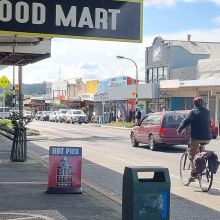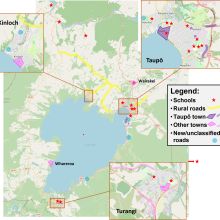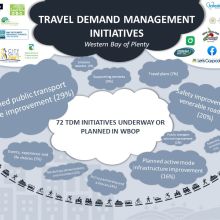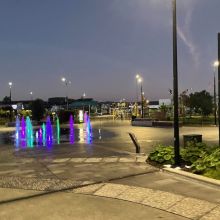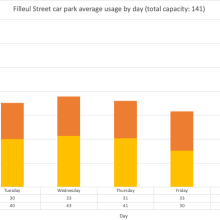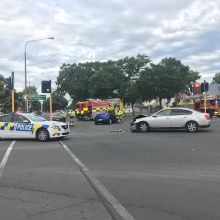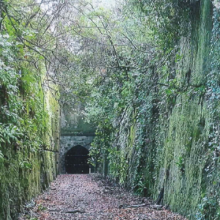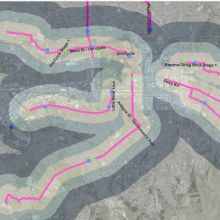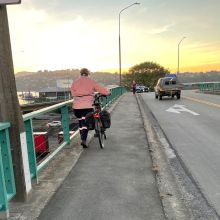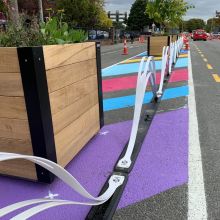Project filter
Climate Emergency Response Funding application support
ViaStrada assisted the Far North District Council in their component of Northland Transport Alliances’ wider application for the Climate Emergency Response Fund (CERF). Using criteria and weightings, projects were ranked by how well they achieve the four CERF objectives:
1. Is the project part of an urban cycle network?
2. Does the project improve urban neighbourhood walkability?
3. Does the project support safer travel to school?
4. Does the project make public transport more reliable and easier to use?Key Contact: Nick ReidTaupō District Speed Management Plan
ViaStrada was commissioned by Taupō District Council (TDC) to prepare a Speed Management Plan for their district. The Plan is based on the new Waka Kotahi (NZ Transport Agency) speed management policy and guidance, which reflects a more holistic approach to setting speed limits based on matters of road safety, community concern, and support for active modes.
Key Contact: Glen KooreyWestern Bay Sub-region Travel Demand Management (TDM) Scoping Study
ViaStrada supported Vitruvius by preparing an online StoryMap of Travel Demand Management case studies, assessing travel demand by each mode, existing and proposed networks, and the opportunity for mode shift if supported by various scenarios of behaviour change investments.
Key recommended actions arising from this work include:
Key Contact: John LieswynPūtahi Park SANF audit
Whangārei’s new central landmark Pūtahi Park, opened in March 2022. Pūtahi means “a place where everyone can gather and enjoy themselves” and this park was given that name because of all the activities such as water feature, mini trampolines, slackline tight rope and plenty of seating at this park.
Pūtahi Park is situated within the town within the city centre of Whangārei, it is a connection point for all the Whangārei urban cycle network.
Key Contact: John LieswynDunedin parking surveys
Dunedin City Council staff asked ViaStrada to set up and complete a survey of parking demand in the city centre. The aim of this was to provide a comprehensive picture of parking usage over time (during the day and week) to inform future parking strategies.
Key Contact: John LieswynCosts of road transport accidents
ViaStrada delivered a working paper summarising the methodology and calculations to derive estimates of the Total (Social) Costs, Average Costs, Marginal Costs and Marginal Externality Costs of road transport-related "accidents" in New Zealand (for both motorised and non-motorised users). This was a component in a wider NZ study on domestic transport costs and charges.
Key Contact: Glen KooreyTwin Tunnels Trail (Mosgiel to Dunedin)
The Dunedin Tunnels Trail Trust (DTTT) project is to provide a 15 km safe and user-friendly cycle and walking trail between Dunedin and Mosgiel. It includes two redundant rail tunnels at Chain Hills and Caversham built in the 1870s.
Key Contact: Warren LloydCycling Demand Model
Waka Kotahi NZ Transport Agency is developing forecasting methodologies for each of the quantitative measures in the new land transport benefits framework. As part of that exercise, a new model has been developed by ViaStrada and WSP to forecast cycling demand. This follows on from WSP's research on the Latent Demand for Walking and Cycling, published as Research Report 676.
Key Contact: John LieswynDunedin central city cordon count
How do people arrive in our central cities? Is it changing as we start to invest in walking, cycling and public transport? ViaStrada ran the third annual ‘cordon count’, providing a snapshot of how people arrive at and travel through central Dunedin.
Key Contact: John LieswynInfrastructure for quick-build cycleways
Waka Kotahi commissioned ViaStrada to undertake research on quick-build (interim) cycleway infrastructure. Some of New Zealand’s Road Controlling Authorities (RCAs) are responding to the imperatives of the Road to Zero strategy, the Climate Change Emergency Declaration, and emissions reduction planning by reallocating road space and supporting mode shift to cycling. The Innovating Streets programme of 2020/21 led to the rollout of several demonstration (1 day to 1 month), pilot (1 month to 1 year) and interim (5+ year) cycleways.
Key Contact: John Lieswyn
